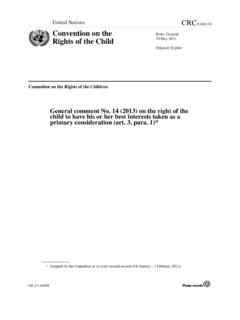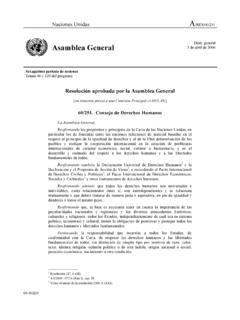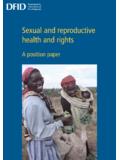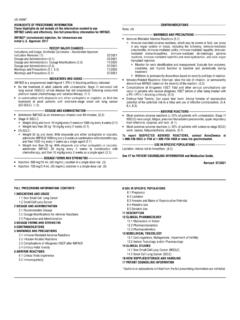Transcription of United Nations CCPR/C/GC/34 International Covenant on
1 United Nations CCPR/C/GC/34 . International Covenant on Distr.: General 12 September 2011. Civil and Political Rights Original: English Human Rights Committee 102nd session Geneva, 11-29 July 2011. General comment No. 34. Article 19: Freedoms of opinion and expression General remarks 1. This general comment replaces general comment No. 10 (nineteenth session). 2. Freedom of opinion and freedom of expression are indispensable conditions for the full development of the person. They are essential for any society. 1 They constitute the foundation stone for every free and democratic society. The two freedoms are closely related, with freedom of expression providing the vehicle for the exchange and development of opinions.
2 3. Freedom of expression is a necessary condition for the realization of the principles of transparency and accountability that are, in turn, essential for the promotion and protection of human rights. 4. Among the other articles that contain guarantees for freedom of opinion and/or expression, are articles 18, 17, 25 and 27. The freedoms of opinion and expression form a basis for the full enjoyment of a wide range of other human rights. For instance, freedom of expression is integral to the enjoyment of the rights to freedom of assembly and association, and the exercise of the right to vote. 5. Taking account of the specific terms of article 19, paragraph 1, as well as the relationship of opinion and thought (article 18), a reservation to paragraph 1 would be incompatible with the object and purpose of the Furthermore, although freedom of opinion is not listed among those rights that may not be derogated from pursuant to the provisions of article 4 of the Covenant , it is recalled that, in those provisions of the Covenant that are not listed in article 4, paragraph 2, there are elements that in the 1.
3 See communication No. 1173/2003, Benhadj v. Algeria, Views adopted on 20 July 2007; No. 628/1995, Park v. Republic of Korea, Views adopted on 5 July 1996. 2. See the Committee's general comment No. 24 (1994) on issues relating to reservations made upon ratification or accession to the Covenant or the Optional Protocols thereto, or in relation to the declarations under article 41 of the Covenant , Official Records of the General Assembly, Fiftieth Session, Supplement No. 40, vol. I (A/50/40 (Vol. I)), annex V. CCPR/C/GC/34 . Committee's opinion cannot be made subject to lawful derogation under article 4 . 3. Freedom of opinion is one such element, since it can never become necessary to derogate from it during a state of 6.
4 Taking account of the relationship of freedom of expression to the other rights in the Covenant , while reservations to particular elements of article 19, paragraph 2, may be acceptable, a general reservation to the rights set out in paragraph 2 would be incompatible with the object and purpose of the Covenant . 5. 7. The obligation to respect freedoms of opinion and expression is binding on every State party as a whole. All branches of the State (executive, legislative and judicial) and other public or governmental authorities, at whatever level national, regional or local . are in a position to engage the responsibility of the State party. 6 Such responsibility may also be incurred by a State party under some circumstances in respect of acts of semi-State entities.
5 7 The obligation also requires States parties to ensure that persons are protected from any acts by private persons or entities that would impair the enjoyment of the freedoms of opinion and expression to the extent that these Covenant rights are amenable to application between private persons or 8. States parties are required to ensure that the rights contained in article 19 of the Covenant are given effect to in the domestic law of the State, in a manner consistent with the guidance provided by the Committee in its general comment No. 31 on the nature of the general legal obligation imposed on States parties to the Covenant . It is recalled that States parties should provide the Committee, in accordance with reports submitted pursuant to article 40, with the relevant domestic legal rules, administrative practices and judicial decisions, as well as relevant policy level and other sectorial practices relating to the rights protected by article 19, taking into account the issues discussed in the present general comment.
6 They should also include information on remedies available if those rights are violated. Freedom of opinion 9. Paragraph 1 of article 19 requires protection of the right to hold opinions without interference. This is a right to which the Covenant permits no exception or restriction. Freedom of opinion extends to the right to change an opinion whenever and for whatever reason a person so freely chooses. No person may be subject to the impairment of any rights under the Covenant on the basis of his or her actual, perceived or supposed opinions. All forms of opinion are protected, including opinions of a political, scientific, historic, moral or religious nature. It is incompatible with paragraph 1 to criminalize the holding of an The harassment, intimidation or stigmatization of a person, including arrest, 3.
7 See the Committee's general comment No. 29 (2001) on derogation during a state of emergency, para. 13, Official Records of the General Assembly, Fifty-sixth Session, Supplement No. 40, vol. I. (A/56/40 (Vol. I)), annex VI. 4. General comment No. 29, para. 11. 5. General comment No. 24. 6 See the Committee's general comment No. 31 (2004) on the nature of the general legal obligation imposed on States parties to the Covenant , para. 4, Official Records of the General Assembly, Fifty- ninth Session, Supplement No. 40, vol. I (A/59/40 (Vol. I)), annex III. 7. See communication No. 61/1979, Hertzberg et al. v. Finland, Views adopted on 2 April 1982. 8. General comment No. 31, para. 8; See communication No.
8 633/1995, Gauthier v. Canada, Views adopted on 7 April 1999. 9. See communication No. 550/93, Faurisson v. France, Views adopted on 8 November 1996. 2. CCPR/C/GC/34 . detention, trial or imprisonment for reasons of the opinions they may hold, constitutes a violation of article 19, paragraph 10. Any form of effort to coerce the holding or not holding of any opinion is Freedom to express one's opinion necessarily includes freedom not to express one's opinion. Freedom of expression 11. Paragraph 2 requires States parties to guarantee the right to freedom of expression, including the right to seek, receive and impart information and ideas of all kinds regardless of frontiers. This right includes the expression and receipt of communications of every form of idea and opinion capable of transmission to others, subject to the provisions in article 19, paragraph 3, and article It includes political discourse,13 commentary on one's own 14.
9 And on public affairs,15 canvassing,16 discussion of human rights,17 journalism,18 cultural and artistic expression,19 teaching, 20 and religious It may also include commercial advertising. The scope of paragraph 2 embraces even expression that may be regarded as deeply offensive, 22 although such expression may be restricted in accordance with the provisions of article 19, paragraph 3 and article 20. 12. Paragraph 2 protects all forms of expression and the means of their dissemination. Such forms include spoken, written and sign language and such non-verbal expression as images and objects of Means of expression include books, newspapers,24 pamphlets,25. posters, banners,26 dress and legal submissions.
10 27 They include all forms of audio-visual as well as electronic and internet-based modes of expression. Freedom of expression and the media 13. A free, uncensored and unhindered press or other media is essential in any society to ensure freedom of opinion and expression and the enjoyment of other Covenant rights. It constitutes one of the cornerstones of a democratic society. 28 The Covenant embraces a 10. See communication No. 157/1983, Mpaka-Nsusu v. Zaire, Views adopted on 26 March 1986; No. 414/1990, Mika Miha v. Equatorial Guinea, Views adopted on 8 July 1994. 11. See communication No. 878/1999, Kang v. Republic of Korea, Views adopted on 15 July 2003. 12. See communications Nos. 359/1989 and 385/1989, Ballantyne, Davidson and McIntyre v.












